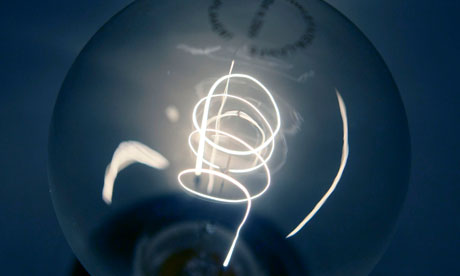Energy efficiency could allow UK to close 22 power stations
Government launches wide-ranging energy efficiency strategy including £39m pot for research into changing behaviour

Incandescent lightbulbs have already been phased out in Europe; newer technologies such as LEDs and CFLs promise energy and financial savings. Photograph: Ina Fassbender/REUTERS
The government has unveiled a wide-ranging package of new efficiency measures that could cut the UK's energy use by 11% by 2020, while providing a major boost to the economy and living standards.
The Department of Energy and Climate Change (DECC) today unveiled the UK's first national Energy Efficiency Strategy, which aims to kick start "a revolution" in UK energy efficiency across all sectors, including housing manufacturing, and transport.
The strategy identifies four significant barriers that have consistently hampered energy efficiency improvements: an underdeveloped market; lack of information on energy efficiency; misaligned financial incentives, which mean the person who is responsible for making improvements does not always receive the benefits of their actions; and the hassle of installing efficiency measures.
The document argues that domestic energy efficiency is effectively targeted by existing initiatives, such as the Green Deal, but warns there is a greater need for policies that drive improvements in commercial, industrial and public sector energy efficiency.
As such, the strategy confirms DECC will fund a nationwide roll out of London's RE:FIT retrofit programme for public buildings, which aims to reduce the risk, cost and time taken for public buildings to install energy efficiency measures through the use of an energy-service company (ESCO) financing model.
DECC said it was also considering rolling out its recently launched Green Deal to cover businesses of all sizes.
In addition, the department announced plans to invest £39m in five so-called End Use Energy Demand Centres, which will research how to change behaviour by consumers and businesses to save more energy.
It will also launch a trial of product-labels on household appliances with retail chain John Lewis. Labels will show the lifetime running costs of products to encourage customers to purchase goods that are more energy efficient.
Writing exclusively for BusinessGreen, Climate Change Minister Greg Barker, said the strategy aimed to "connect finance with demand, encourage innovation, and make energy efficiency information more accessible to the consumer".
"We need to excite people with the opportunities that energy efficiency brings and show them that saving energy not only cuts emissions, but supports green jobs, innovation and enterprise," he wrote. "There is so much potential in this area and that is why it is so important we have a clear plan of action - now, next year and over the coming decades."
The report shows that cost effective investments in energy efficiency could save the UK 196TWh in 2020, equivalent to output from 22 power stations.
Implementing these recommended measures could reduce energy consumption by 11% by the end of the decade, rising to savings of 13% by 2025 compared to business as usual projections.
The measures also have the potential to save 41 megatonnes of CO2 equivalent emissions in 2020, according to the report.
Richard Knight, deputy chief engineer at the government and industry-backed Energy Technologies Institute (ETI) welcomed the government's renewed focus on energy saving.
"We have consistently said that energy efficiency is a key development priority for the UK and it is good to see more formulised thinking published in this area," he said.
"It is something that all players in the low carbon arena need to make a contribution towards as the cheapest energy is the energy that we do not actually use.
He also welcomed the launch of three new energy efficiency Technology Innovation Needs Assessments (TINAs) which highlight the opportunity for innovation in energy efficiency.
"It is vital that the UK embraces an innovative approach to its energy generation in the future so that we can share the economic benefits of cost reduction across producers, suppliers and importantly end consumers," he said.
No hay comentarios:
Publicar un comentario